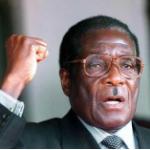A Tale of Two Leaders
 This year marks the 30th year that Robert Mugabe has held power in Zimbabwe, and the 20th year since Nelson Mandela was released from prison in South Africa. While Mandela used his power to advance harmony, Mugabe has abused his power for ideological reasons.
This year marks the 30th year that Robert Mugabe has held power in Zimbabwe, and the 20th year since Nelson Mandela was released from prison in South Africa. While Mandela used his power to advance harmony, Mugabe has abused his power for ideological reasons.
Britain’s Spectator magazine, (arguably the best of its kind in the world), has a provocative article comparing Nelson Mandela and Robert Mugabe.
This year marks the 30th year that Mugabe has held power in Zimbabwe, and the 20th year since Mandela was released from prison in South Africa. Mugabe, 86, spent 11 years in prison in Rhodesia: Mandela, 92 in July, was imprisoned for 27 years during apartheid.
Both men are charismatic, and when both came to power as presidents of their countries, both defied the predictions of many who were convinced there’d be racial bloodbaths in both countries.
At first, both encouraged reconciliation. Mandela was generous and forgiving towards South African whites; Mugabe praised his erstwhile foe, Ian Smith, and publicly recognized that Smith’s stewardship had made Zimbabwe the envy of Africa - the continent’s breadbasket with the most workable infrastructure.
I was in Zimbabwe a year after independence when things began to go wrong. By 1982, Mugabe had turned paranoid and vindictive. Shortages were everywhere. White farmers were harassed and blamed.
In South Africa, under Mandela, racial relations were smoother than most expected. Crime flourished. Today it is a dangerous country if tourists aren’t careful. But it’s not state-sponsored crime. The country works.
Zimbabwe morphed out of Rhodesia because Britain’s Margaret Thatcher and South Africa gave up on Smith and he was pressured into surrendering. Amazingly, most of Rhodesia’s 250,000 whites who were the backbone of the economy, reluctantly but sincerely became Zimbabweans.
Steadily Mugabe became the Stalin of Africa. His infamous 5th Brigade, trained by North Koreans, was turned against the Ndebele people of the south, whose ancestors were Zulus and whose leader, Joshua Nkomo, did most of the fighting in the guerrilla war. Mugabe talked war; Nkomo made war.
I visited Nkomo a couple of times in his rather tatty bastion in Bulawayo. Deceptively jolly, he was bitter at Mugabe’s betrayal of their awkward alliance and rivalry, recounting various assassination attempts.
Fearing for his family, if not his own life, Nkomo send his family to Canada. I remember talking to Nkomo about Ian Smith, whose house in Harare was beside the Chinese embassy and the subject of jokes about electronic surveillance.
I mentioned that I thought Smith was “a brave man” to stay in Zimbabwe and challenge the policies of Mugabe that hurt the country. Nkomo looked hard at me and said: “Ian Smith is not just a brave man. He is a very, very brave man.” High tribute from a former warrior foe.
Today, Mugabe is reviled among civilized people and sensible countries. Zimbabweans mostly detest and fear him, but he refuses to accept defeat in elections and won’t leave office. He is no man of peace like Mandela.
Morgan Tsvangirai’s MDC (Movement for Democratic Change) won the last election but was cheated out of office. Meanwhile, Zimbabwe disintegrates.
By contrast, Mandela, may not have the brain-power of Mugabe, but has a saint-like quality and reputation. Mandela was awarded the Order of Canada in 1998, and made an honorary citizen in 2001. Mugabe’s only friend in Canada is (or was) Jean Chretien when he was PM, who defended Mugabe from rebuke at various Commonwealth summit conferences.
Mugabe and Mandela are living evidence that power affects different people differently. One has abused his power for ideological reasons, the other has harnessed it to advance harmony among all people.